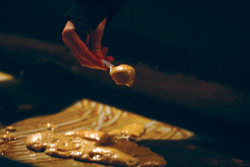I always thought the expression "slow as molasses" referred to the viscous liquid's stubbornly glacieresque pace: You could probably upend a bottle of the stuff while your pancakes were still being plated and not have to worry about a drop touching the table. That's pretty slow.

But, as it turns out, making molasses is slower still. Across Western North Carolina in October, farmers are devoting long days to pressing the juice from just-harvested sweet sorghum cane, bottling the thick syrup they'll serve with their wintertime breakfasts and stir into their gingerbread dough. Folks who want to get the work of stirring and skimming done before sundown have to start heating their bathtub-sized sorghum boxes at dawn.
Any food scholar will tell you what these mountaineers are making isn't molasses, which is a byproduct of crystallizing sugar. Yet molasses is the word almost everyone uses at David and Diane Burnette's annual sorghum squeeze in eastern Haywood County, a two-decades-old family tradition that recalls a time when most anyone with a patch of Appalachian land made their own sweetener in the fall.
A man hunkered at the edge of a picking circle stops strumming his guitar: "Are the molasses ready yet?" he asks. "You going to take the molasses off?" asks a man who looks like an eater who'd happily let sorghum syrup seep all over his breakfast plate, dripping off his biscuit and pooling beneath his ham. He's fingering the plastic spoon he's stuck into the bib pocket of his overalls, ready to scrape vestigial syrup off the bottom of the box as soon as it's been emptied.
A less patient partygoer chimes in, "What are you waiting for, Aunt Diane?"
"We're just letting it get a little thicker," says Burnette, who bears the unenviable responsibility of decreeing when the molasses are done. If she makes the call too soon, the molasses won't set right. If she hesitates a few minutes too long, the molasses will overheat, infecting the whole box with the acrid taste of burnt sugar.

Burnette hasn't made a mistake yet, a record attributable to the remarkable seriousness she evinces while standing at the box. She monitors the bubbling sorghum juice the way a bear watches a stream for trout, ready to pounce on the smallest streak of green. Fresh cane juice is all green, and it's up to Burnette and her helpers — armed with crookneck hoes — to skim off the green foam and bubbles as the box gets hotter. (The skimmings are a step away from homemade rum, which is why ATF agents have been known to show up at molasses makings. On the record, sorghum farmers say they feed the liquid scraps to their animals. "Daddy said an old dog would like them," says David Burnette, a metalworking instructor at Haywood Community College.)
By 8 p.m., the green's so scarce that only experienced eyes can spot it. Between skims, Burnette begins dipping into the juice, checking its tackiness between her thumb and forefinger.
"It takes two licks to get it off your finger now," crows Burnette's most loyal evening helper, Doug Knight.
Burnette nods, but doesn't give the signal to turn down the flame. Her resolute studiousness is unmatched by anyone else in the syruping shack; The event has the air of a tailgate party, with attendees seated in camp chairs arranged in ragged circles. There's a small board set out for impromptu buck dancing, and oniony corn fritters and cowboy coffee available for snacking. Only the latecomers are hungry, though: A potluck supper, featuring heaps of fried mountain trout, dark greens flecked with bacon, deviled eggs, fried chicken, chocolate cake and banana pudding, threatens to eclipse the molasses.
"People used to make molasses for a purpose," David Burnette says. "We just make it for community fun."
An abolitionist-minded patent officer introduced sorghum, an African grass, to the U.S. in 1853. Midwesterners enthusiastically experimented with the crop, hoping it would allow them to enjoy the sweetness of sugar without having to support the execrable slave labor system that produced it. But extracting dry sugar from syrup proved so troublesome that most northern farmers gave up on sorghum within a few decades; by the 1880s, when domestic syrup makers churned out 24 million gallons of molasses, sorghum was considered a Southern crop. Before sweetness was a flavor chemists could concoct, saccharine-starved Southerners who couldn't afford imported sugar were forced to grow sorghum cane.
"A lot of old people don't like molasses because they growed up on it," says David Burnette, whose grandfather produced 1,000 gallons of sorghum syrup each season, putting his nine children and hired hands to work running an evaporator 24 hours a day.
It's nearly 9 p.m. when Burnette quietly declares the molasses ready. They're creamy-sweet, blanketed by a thick quilt of whitish foam that David Burnette swears he likes better than the syrup. On her cue, a quartet of men sidle up to the box like pallbearers and slide it onto cinderblocks. David Burnette shimmies a ladder-back chair up to its spigot, milkmaid-style, and the jarring operation commences. After all the pints and quarts are filled, there's still a little syrup in the box and – suddenly – a wicker basket of biscuits being passed.
"That's it, gather round boys!" David Burnette shouts. "Everybody dive in!"
And, without any further prodding, they do. Spoons and biscuits graze the walls of the metal box, salvaging a mountain treat that tastes much as it did over a century ago.
The Burnettes have finished their sorghum syrup season, but Madison County farmers Andy and Cathy Bennett have invited the public to join them for their Saturda- night sorghum squeezings on Oct. 10, 17 and 24. For more information, call 380-0756.



Before you comment
The comments section is here to provide a platform for civil dialogue on the issues we face together as a local community. Xpress is committed to offering this platform for all voices, but when the tone of the discussion gets nasty or strays off topic, we believe many people choose not to participate. Xpress editors are determined to moderate comments to ensure a constructive interchange is maintained. All comments judged not to be in keeping with the spirit of civil discourse will be removed and repeat violators will be banned. See here for our terms of service. Thank you for being part of this effort to promote respectful discussion.